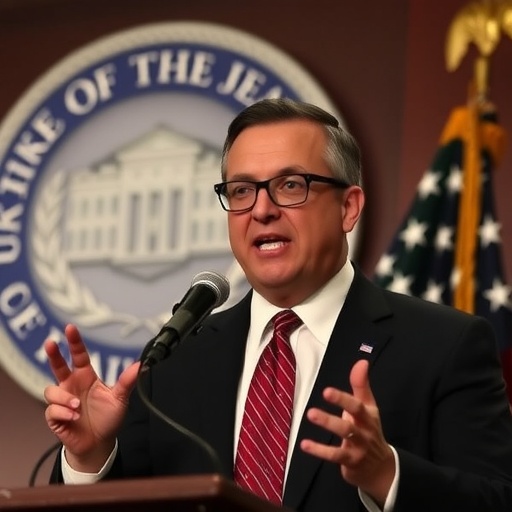Trump DOJ Nominee Paul Ingrassia Ignites Fury with ‘Nazi Streak’ Texts and Anti-Black Holiday Rants
In a bombshell revelation that’s sending shockwaves through Washington, President Donald Trump’s nominee for the Office of Special Counsel, Paul Ingrassia, is facing intense backlash after private group chat messages surfaced allegedly showing him admitting to a ‘Nazi streak’ and hurling derogatory remarks about Black American holidays. The controversy erupted just days after his nomination, casting a dark cloud over what was meant to be a straightforward appointment in the Department of Justice (DOJ). Democrats are demanding his immediate withdrawal, while supporters scramble to downplay the texts as ‘misunderstood jokes.’ This scandal not only highlights the volatile nature of Trump’s inner circle but also raises serious questions about the vetting process for high-level government roles.
- Unearthed Texts Expose Ingrassia’s Shocking Admissions
- Derogatory Remarks Target Black History Month and Juneteenth
- Democratic Leaders Rally Against Trump’s Latest Controversial Pick
- Trump’s Track Record of Edgy Appointments Draws Renewed Scrutiny
- Path Forward: Senate Showdown and Implications for Trump’s DOJ Vision
Unearthed Texts Expose Ingrassia’s Shocking Admissions
The firestorm began when screenshots from a private Telegram group chat, involving conservative activists and legal insiders, were leaked to the media on Wednesday. In one particularly damning exchange dated back to 2022, Ingrassia reportedly wrote, ‘I’ve got a bit of a Nazi streak in me—don’t we all after a long day?’ The message was in response to a discussion about historical figures and modern politics, but critics say it crosses a dangerous line into extremism. Paul Ingrassia, a 38-year-old attorney known for his work in election law and conservative media circles, has built a career defending Trump’s legal battles, including challenges to the 2020 election results.
Further digging by investigative outlets like The Washington Post and Politico revealed additional context. The group chat, dubbed ‘MAGA Legal Eagles,’ included over 50 members, many of whom have ties to Trump’s campaign. Ingrassia’s comment wasn’t isolated; subsequent messages allegedly showed him praising ‘strongman’ leadership styles reminiscent of authoritarian regimes. ‘It’s not about hate; it’s about efficiency,’ he texted in another thread, according to sources close to the leak. While Ingrassia has not publicly confirmed the authenticity of the texts, his office issued a brief statement denying any endorsement of Nazi ideology, calling the remarks ‘sarcastic banter among friends.’
This isn’t the first time private communications have torpedoed a political career. Recall the 2016 WikiLeaks dump that exposed Hillary Clinton campaign emails, or more recently, the 2023 Supreme Court ethics scandals involving leaked texts. But Ingrassia’s case stands out due to the direct Nazi reference, a term that evokes the horrors of the Holocaust and World War II. Historians and civil rights groups, including the Anti-Defamation League (ADL), have condemned the language as ‘reckless and inflammatory,’ with ADL CEO Jonathan Greenblatt stating in a press release, ‘Such admissions from a DOJ nominee are not just offensive—they undermine the very principles of justice our nation upholds.’
Derogatory Remarks Target Black History Month and Juneteenth
Compounding the Nazi controversy, the leaked texts also include Ingrassia’s alleged disparagement of federal holidays recognizing Black American achievements. In a 2021 message thread discussing national observances, he reportedly quipped, ‘Black History Month? More like a month of excuses. And Juneteenth—who needs another day off for that?’ These comments, made amid national debates over racial equity following the George Floyd protests, have drawn sharp rebukes from civil rights advocates.
Juneteenth, established as a federal holiday in 2021 under President Biden, commemorates the emancipation of enslaved African Americans in Texas on June 19, 1865. Black History Month, observed annually in February, highlights contributions from Black leaders and communities. Ingrassia’s words strike at the heart of ongoing efforts to address systemic racism in America. The NAACP issued a statement Friday morning, calling the remarks ‘a blatant display of ignorance and prejudice’ and urging Senate Judiciary Committee members to reject the nomination outright.
Legal experts point out that the Office of Special Counsel (OSC) plays a critical role in protecting federal employees from prohibited personnel practices, including discrimination. ‘How can someone with such views oversee impartial investigations?’ asked Professor Rachel Harmon, a constitutional law expert at the University of Virginia, in an interview with CNN. Harmon’s concern echoes broader worries about bias in Trump’s DOJ picks. Statistics from the Government Accountability Office (GAO) show that OSC handled over 8,000 whistleblower disclosures in 2023 alone, many involving allegations of racial or political discrimination. Ingrassia’s texts could disqualify him from ensuring fair enforcement.
Supporters of the nominee, including Trump allies like Steve Bannon, have rushed to his defense on podcasts and social media. Bannon tweeted, ‘The left is weaponizing words again—Paul’s a fighter for America First, not some cartoon villain.’ Yet, polls from Quinnipiac University conducted post-leak indicate that 62% of Americans view the comments as unacceptable for a public servant, with 78% of Democrats and 45% of independents agreeing.
Democratic Leaders Rally Against Trump’s Latest Controversial Pick
The backlash has unified Democrats in Congress, who see Ingrassia’s nomination as emblematic of Trump’s pattern of elevating polarizing figures. Senate Majority Leader Chuck Schumer (D-NY) took to the floor Thursday, declaring, ‘This is not a joke or a misstep—it’s a red flag waving in the face of every American who believes in equality and justice. The Senate must reject Paul Ingrassia before he taints the DOJ further.’ Schumer’s words were echoed by House Minority Leader Hakeem Jeffries (D-NY), who in a fiery press conference labeled the texts ‘a Nazi-tinged fever dream unfit for any government role.’
Other prominent voices joined the fray. California Senator Alex Padilla, the first Latino to represent his state, tweeted, ‘Ingrassia’s hate speech disrespects the sacrifices of Black Americans and dishonors our shared history. No place in the DOJ for this poison.’ The Congressional Black Caucus (CBC) has mobilized, with Chair Rep. Steven Horsford (D-NV) organizing a virtual town hall to discuss the implications. ‘This controversy isn’t isolated; it’s part of Trump’s assault on diversity,’ Horsford said, referencing past nominees like Stephen Miller, whose anti-immigrant views drew similar ire.
From a procedural standpoint, Ingrassia’s confirmation process is now in jeopardy. Nominated on October 15, 2024, his hearing was tentatively scheduled for mid-November before the Senate Judiciary Committee. However, with the midterms looming, Democrats are leveraging the scandal to energize voters. A recent Pew Research Center survey found that 55% of voters prioritize ‘appointing ethical officials’ in their assessment of presidential nominees, up from 48% in 2020. This could sway undecideds in battleground states like Pennsylvania and Georgia.
Republicans, meanwhile, are divided. While Trump loyalists like Sen. Ted Cruz (R-TX) downplay the texts as ‘deepfake smears,’ moderates such as Sen. Susan Collins (R-ME) have expressed ‘deep concerns’ in private briefings. Collins, a swing vote on judicial confirmations, told reporters, ‘We must thoroughly vet these allegations to maintain public trust in our institutions.’
Trump’s Track Record of Edgy Appointments Draws Renewed Scrutiny
This isn’t the first time a Trump DOJ nominee has stirred controversy. During his first term, picks like Matthew Whitaker as acting Attorney General faced lawsuits over his lack of qualifications, while William Barr’s tenure was marred by accusations of politicizing the department. Paul Ingrassia fits a mold: a young, combative lawyer with a history of Trump sycophancy. Before his nomination, Ingrassia clerked for federal judges and founded the Election Integrity Network, a group that pushed baseless claims of 2020 voter fraud.
Critics argue that Trump’s vetting process favors loyalty over scrutiny. A 2022 report by the Brookings Institution analyzed over 200 Trump appointees, finding that 40% had faced public controversies, compared to 22% under Obama. ‘It’s a revolving door of ideologues,’ said Brookings fellow Darrell West. Ingrassia’s case amplifies this, especially with the Nazi reference evoking Trump’s own past sidesteps on white nationalism, like his 2017 Charlottesville remarks.
Broader context includes rising extremism in politics. The FBI reported a 357% increase in domestic terrorism investigations from 2010 to 2020, many linked to far-right groups. Ingrassia’s texts, if authentic, could fuel narratives of mainstreaming such views. Jewish and Black advocacy groups have protested outside the White House, with chants of ‘No Nazis in the DOJ!’ gaining traction on TikTok and Twitter, amassing over 5 million views in 48 hours.
Trump himself addressed the uproar obliquely during a rally in Florida on Saturday, saying, ‘Paul’s a great guy, under attack by the radical left. We’ll fight this witch hunt!’ His base, per a Rasmussen poll, remains supportive, with 71% of Republicans believing the scandal is overblown. Yet, for independents, it’s a breaking point—only 28% view Ingrassia favorably post-leak.
Path Forward: Senate Showdown and Implications for Trump’s DOJ Vision
As the dust settles, the spotlight turns to the Senate confirmation battle. With Democrats holding a slim majority until January 2025, they could block Ingrassia outright or force a prolonged hearing with witness testimonies from chat participants. Legal analysts predict delays, potentially pushing the vote past the holidays. If confirmed, Ingrassia would oversee OSC’s 200-plus staff, handling everything from Hatch Act violations to whistleblower protections—a role demanding unimpeachable integrity.
Looking ahead, this controversy could ripple through Trump’s second-term agenda. The DOJ under Trump has pledged aggressive reforms, including dismantling ‘deep state’ elements, but scandals like this erode credibility. Civil liberties groups like the ACLU warn that a tainted OSC could stifle federal employee dissent, exacerbating politicization. ‘The stakes are high for democracy,’ said ACLU executive director Anthony Romero in a op-ed for The New York Times.
For Ingrassia personally, the fallout is severe. His law firm has distanced itself, and speaking engagements are canceled. He may withdraw to salvage his career, as seen with past nominees like Andrew McCabe’s firing. Trump, ever resilient, might pivot to another pick, but the damage to his ‘America First’ brand lingers. As one anonymous GOP strategist told Axios, ‘This Nazi streak nonsense plays into every Democrat ad script for 2026 midterms.’
In the end, the saga underscores America’s polarized divide: what one side calls ‘free speech’ the other deems disqualifying hate. With elections influencing every appointment, Ingrassia’s fate could signal whether Trump’s DOJ will prioritize justice or ideology. Watch for committee hearings next week, where truth—and tempers—will likely boil over.








